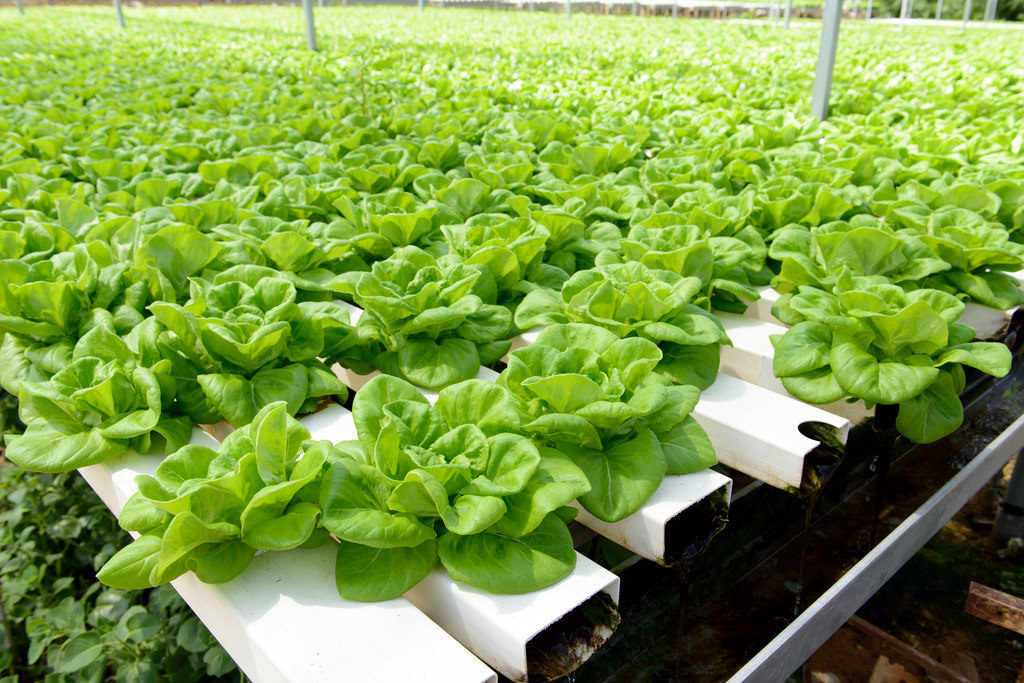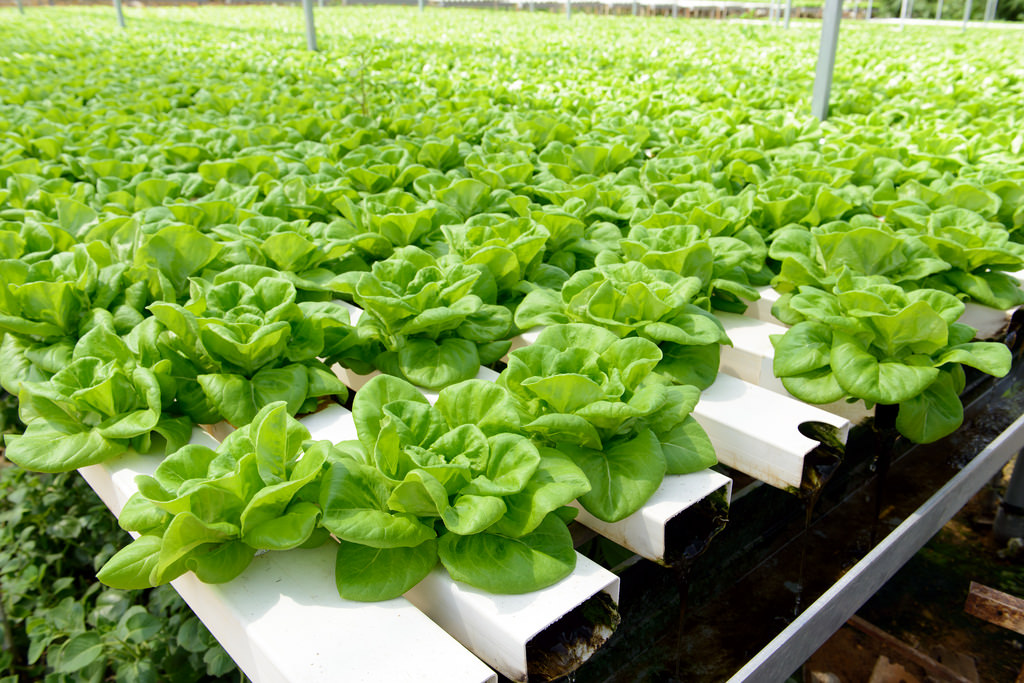
By Glenn Kern, CFSA Organic Policy Coordinator
On October 31 through November 2, 2017, the National Organic Standards Board (NOSB) will hold its fall meeting in Jacksonville, Florida. Among the many issues that will be discussed by the Board is the question of whether crops grown in hydroponic production systems should be eligible for Organic certification under the Organic Foods Production Act (OFPA) and the related USDA Organic Regulations. The NOSB, in its capacity as a federal advisory committee, may soon issue a new recommendation on hydroponics to the National Organic Program (NOP), the office of the USDA responsible for overseeing the Organic label.
The National Organic Standards Board and the National Organic Program have been grappling with the question of hydroponics for years without a clear resolution.
At its core, the difficulty of the hydroponics issue arises from statutory and regulatory ambiguity: neither OFPA nor any USDA Organic regulation expressly prohibits or even defines “hydroponics,” thus leaving open for debate the question of whether this production practice should be eligible for Organic certification. Compounding the problem is the fact that hydroponic production systems are conceptualized as existing on a continuum of different growing methods—along with other container-based growing systems, greenhouse production, and of course traditional crop farms where plants are grown in the open ground. Defining and distinguishing between the less traditional growing methods on this continuum has proven to be a thorny task for the NOSB and the NOP.
I’m writing today because we at CFSA would like to know what our members think about hydroponics and whether this production practice should be eligible for Organic certification. CFSA staff will be in attendance at the NOSB meeting in Jacksonville, along with many other stakeholders in the Organic industry. We won’t be submitting comments about hydroponics to the Board in October, but we may take a position at a future meeting if we learn that our members will be affected by any proposed regulations either prohibiting or allowing hydroponics.
What follows is the first of four installments in a series of blog posts about hydroponics and the Organic label. The second and third installments will be published on October 17 and 24, respectively. The fourth installment will be published after the NOSB meeting in Jacksonville and will provide a synopsis of any decision the Board makes about hydroponics.
For those of you who are already familiar with the debate and are ready to put in your two cents, please feel free to email me with your comments at glenn@carolinafarmstewards.org. All replies are confidential and we’d be grateful to hear from you.
If you want to learn more about what hydroponic growing systems are, what the law and regulations say, and what arguments are being made by those in favor of and opposed to allowing hydroponics, read on!
Part One
(A) The Regulatory Roles of the NOSB and the NOP
Before diving into the specifics of the debate about whether hydroponics and other container-based production systems should be “certifiable,” it may be helpful to review the relative roles of the NOSB and the NOP in creating USDA Organic regulations like those being contemplated for hydroponics.
The National Organic Program (NOP) is an office of the USDA located within the Agricultural Marketing Service (AMS). As a part of a federal administrative agency, the NOP is responsible for implementing legislation passed by Congress—in this case, the Organic Foods Production Act of 1990 (OFPA), which is the same law that authorized the USDA to create the NOP. The NOP, like all other administrative entities, must implement legislation in accordance with the Administrative Procedures Act (APA), another law passed by Congress that governs the functioning of administrative agencies, including the process of “rulemaking.” Rulemaking—i.e. the creation of regulations—is one of the means by which administrative agencies carry out the obligations imposed on them by Congress. A “rule,” as defined by the APA, is the “whole or part of an agency statement of general or particular applicability and future effect designed to implement, interpret, or prescribe law or policy or describing the organization, procedure, or practice requirements of an agency….” Put another way, regulations are legally binding statements (“rules”) made by a federal agency to its staff, to citizens, to industry, and to other parts of government about how a law will be implemented.
Although writing the USDA Organic regulations is the sole responsibility of the NOP, Congress included a provision in the Organic Foods Production Act designed to ensure that the NOP would receive input from private citizens and stakeholders throughout various sectors of the Organic industry. OFPA directed the Secretary of the USDA to establish the National Organic Standards Board, a federal advisory committee whose purpose is to assist in the development of standards for substances to be used in Organic production and to advise the Secretary (through the NOP) on any other aspects of the implementation of OFPA. The specific composition of the NOSB is dictated by OFPA. The 15-member Board must include:
(a) four individuals who own or operate an organic farming operation;
(b) two individuals who own or operate an organic handling operation;
(c) one individual who owns or operates a retail establishment with significant trade in organic products;
(d) three individuals with expertise in areas of environmental protection and resource conservation;
(e) three individuals who represent public interest or consumer interest groups;
(f) one individual with expertise in the fields of toxicology, ecology, or biochemistry; and
(g) one individual who is an Organic certifying agent.
The NOSB is further divided into seven Subcommittees, which are responsible for conducting research and analyses and drafting proposals for consideration by the full Board:
(a) Executive;
(b) Certification, Accreditation, and Compliance;
(c) Crops;
(d) Handling;
(e) Livestock (including Aquaculture);
(f) Materials (including GMOs); and
(g) Policy Development.
Key activities of the Board include:
(a) Assisting in the development and maintenance of organic standards and regulations;
(b) Reviewing petitioned materials for inclusion on or removal from the National List of approved and Prohibited Substances;
(c) Recommending changes to the National List;
(d) Communicating with the organic community, including conducting public meetings, soliciting and reviewing public comments ; and
(e) Communicating, supporting and coordinating with the NOP staff.
The NOSB typically meets twice per year, once in the spring and once in the fall. These meetings are open to the public and are the means by which the Board formally carries out the advisory role for which Congress intended it to serve.
At each NOSB meeting, subcommittees present to the full Board their discussion documents and policy proposals related to specific regulatory issues. For each issue, the NOSB hears live and written testimony from the public before deliberating and voting on whether to adopt a discussion document or proposal. An adopted discussion document creates a record of research and analysis conducted by a subcommittee; generally speaking, a subcommittee will provide the full Board with one or more discussion documents on a particular regulatory issue, sometimes over the course of several years, before it provides the Board with a policy proposal. Once a policy proposal is offered to the full Board by a subcommittee, the Board may respond in a variety of ways, including but not limited to (1) adopting the proposal as presented by the subcommittee, (2) amending the proposal in a “non-substantive” manner before adopting it, (3) rejecting the proposal, and (4) referring the proposal back to subcommittee for further development. Any proposal that is adopted by the Board is conveyed to the NOP as a “recommendation” to be used as guidance in its enforcement and rulemaking efforts.
Importantly, the NOSB’s recommendations are not binding on the NOP. As stated in the NOSB Policy and Procedures Manual,
“The USDA cannot delegate its authority as a regulatory body to private citizens, even when those private citizens are appointed by the Secretary to provide advice. Therefore, the NOSB cannot direct USDA or bind the Secretary through its actions; for example, it cannot obligate funds, contract, make NOP staffing decisions, or initiate policies of its own accord.”
However:
“[T]he unique nature of the NOSB and its relationship with the NOP, as established through OFPA, requires that the volunteer Board, which regularly receives stakeholder input through public comment, must work collaboratively with the NOP. Similarly the NOP, as required through OFPA, must consult and collaborate with the NOSB.”
When the NOSB Board meets in Jacksonville, Florida at the end of October, its members will consider proposals presented by the Crops Subcommittee that address various “non-traditional” growing systems, including hydroponics. Specifically, one of the Subcommittee’s proposals is to expressly prohibit hydroponic growing systems from obtaining Organic certification. A more detailed discussion of the Crops Subcommittee’s proposal, including how it has chosen to define “hydroponics” and other non-traditional growing systems, will be included in the second and third installments of this blog series.
There is no guarantee the Board will actually vote to pass or reject the Crops Subcommittee’s proposal as written; rather, the Board may refer the proposal back to the Subcommittee for more development. Some members of the Crops Subcommittee are opposed to the current proposal and have submitted a written analysis of their “minority view” for consideration by the larger Board. Furthermore, based on a public webinar discussion held by the NOSB in August, the Board as a whole appears split on the issue of whether a rulemaking recommendation for hydroponics is appropriate at this time, and if so, what the recommendation should be.
Coming up next:
That’s all for now, folks! Please don’t hesitate to email me at glenn@carolinafarmstewards.org if you have comments or questions. If you want to know more about hydroponics and the Organic label, make sure to stay tuned for the remaining installments, with release dates and discussion topics listed below.
Part Two : October 17
- What exactly are hydroponic systems and how are they different from growing food in the ground?
- What is the current regulatory treatment of hydroponic agriculture within the Organic program?
Part Three : October 24
- What arguments are being made in opposition to and in support of allowing hydroponics to be certified Organic?
- What have the NOSB and the NOP done in the past to address this issue?
Part Four : TBD (mid-November)
- What happened at the NOSB meeting in Jacksonville, Florida?


